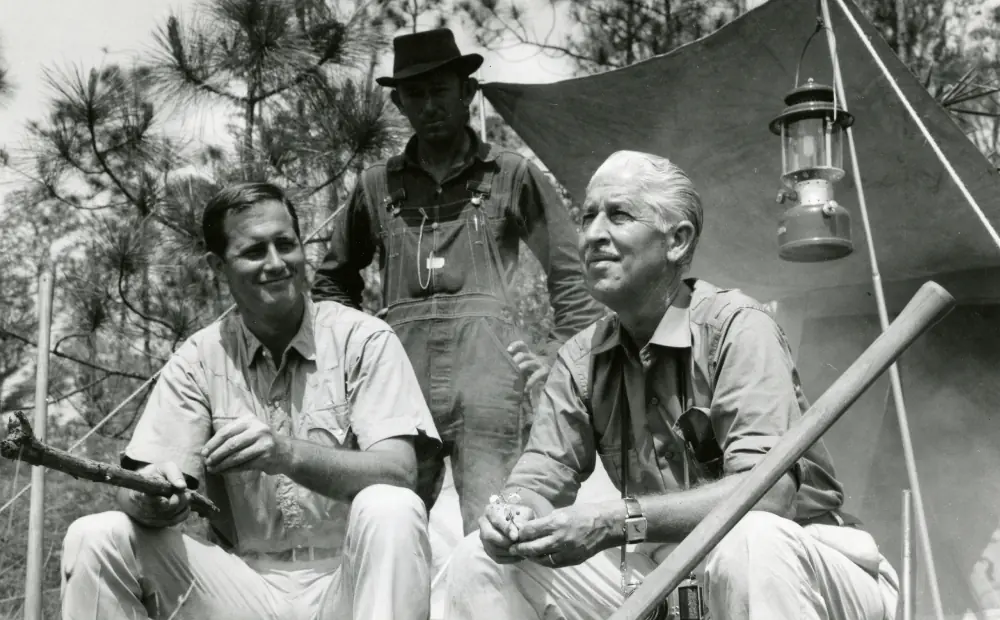0:00
Slots are adorable and also arboreal, which means they live nearly their entire lives high up in trees.
0:09
They're also the slowest mammal on earth, traveling just over 100 feet per day, and that's what makes them so vulnerable in our fast-paced modern world.
0:20
Sloths move so little tiny creatures have adapted to live in their fur, making slots little mobile ecosystems unto themselves.
0:31
These unique mammals are only found in Central and South America, but in 1985, Wild Kingdom's original host, Jim Fowler introduced one to United States audiences with a little help from Johnny Carson.
0:45
It's going right through my coat.
0:46
You're going right through my coat.
0:49
Or you mean the walls are going right through the coats of the skin?
0:56
Today we've traveled to the Gamboa Rainforest in Panama.
1:04
This small country is best known for the Panama Canal, connecting the Pacific and Atlantic Oceans.
1:10
Panama is home to more than 11,000 species of plants and animals, making it one of the most diverse wildlife regions on Earth.
1:22
And it's home to the Pan American Conservation Association, headed by husband and wife team Nestor and Giselle Correa.
1:30
Nestor and Giselle have dedicated their lives to saving sloths.
1:34
All of the animals in their care are recovering from habitat loss or vehicle strikes, even poachers.
1:40
Wild populations are decreasing.
1:42
We keep building roads, molds, residential areas that they don't understand how danger roads are, animals being attacked by domestic animals, animals getting electrocuted in the power lines, or even poaching and illegal traffic of animals, and sometimes even animals fell in from trees.
2:00
Specialist sloths.
2:01
Sloth populations are threatened throughout the region.
2:05
Main 3 Toed sloths are endangered and pygmy slots are critically endangered with less than 100 of them remaining on Earth, which is why rescue efforts are so important in Panama.
2:21
There's not too many organizations working on wildlife rescue or rehabilitation, so the main purpose of the organization is try to rescue and release animals back into the wild to improve the biodiversity and to keep that biodiversity going.
2:36
Now we're going to do some slot feeding.
2:39
Wow, this guys are between a year, year and a half.
2:42
Sloths mostly eat tree leaves and some fruits and flowers.
2:46
We're going to hang planks like this and be fast because once they smell there's food, they will be fighting for food.
2:54
Oh, you're right.
2:55
Oh, this is fast.
2:56
Oh, my gosh.
2:57
OK.
2:57
Wow.
2:58
I'm amongst the sloths.
2:59
This is pretty cool.
3:00
This is our hibiscus flowers.
3:02
Things like candy.
3:03
Who wants them?
3:04
Oh, you do.
3:05
You're welcome.
3:06
You're doing great.
3:07
Thank you.
3:08
Nestor.
3:09
Do you hear that?
3:11
It's like slot heaven.
3:12
I hear it.
3:13
I mean, it's everywhere.
3:14
It's like surround sound chomping.
3:17
Their stomach is divided in chambers and they don't shoot too much, just taking chunks.
3:23
And that will go through a long, long process.
3:27
It's going to take a week, a week before they do this.
3:30
It's the slowest digestion system in the wild animal Kingdom.
3:35
Super slow.
3:36
That is a good sloth back.
3:38
Even baby sloths are slow eaters, clinging to their mothers and suckling small amounts of milk throughout the day.
3:46
These are all babies, as you can probably tell, and they're still drinking milk.
3:52
This is actually milk from a goat that is specially brought in for these sloths.
3:57
These babies get fed multiple times a day, just like their mothers would do in the wild, and soon, once they're bigger, they'll be on a solid food diet, vegetables and leaves, and then before they know it, they'll be back in the wild fending for themselves.
4:12
Here we go.
4:13
The thing that I love the most is that they eat and drink upside down.
4:18
They're truly an arboreal species, which means they live primarily if not entirely in trees.
4:24
So being upside down is totally normal for them.
4:27
Almost done, all finished.
4:31
Thank you.
4:34
These little orphans and many adults receive regular medical care at the nearby veterinary clinic headed by Doctor Julio Reyes.
4:42
This morning, Giselle brought a sloth in for a checkup.
4:54
Suddenly, Giselle and Doctor Julio receive word that yet another sloth is in danger.
5:06
The firefighters are contacting you for this rescue right now.
5:13
Yes.
5:13
Oh, my gosh.
5:14
And this happens to you every day.
5:15
Not a safe area for the slot.
5:19
It's like in a neighborhood.
5:21
OK, so there are not many trees or anything.
5:22
So you're going to put him in the wild.
5:24
All right, OK, let's go.












